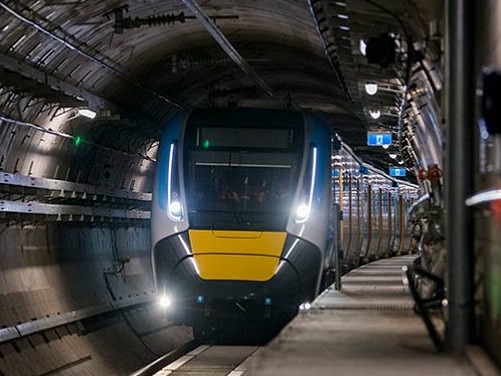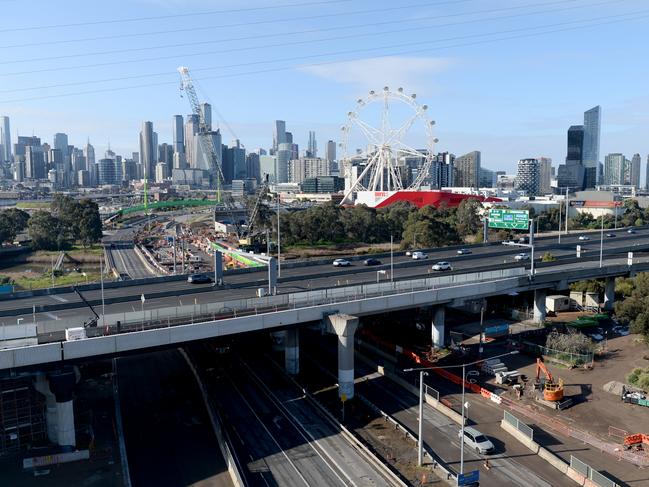Matt Johnston: Soviet-style Allan government refusing to reveal true Metro Tunnel cost
While we will eventually be put out of our misery and get a go live date for the shiny Metro Tunnel, inexplicably we may not get a final price tag thanks to a Soviet-style piece of public sector secrecy from the state government.
Opinion
Don't miss out on the headlines from Opinion. Followed categories will be added to My News.
In coming months you will hear and see a lot about Melbourne’s shiny new Metro Tunnel.
The Allan government is determined that the 9km rail line and its five new stations will open to passengers before Auld lang syne is belted out on New Year’s Eve.
As the Herald Sun revealed this week, however, the task of opening this year has become more challenging because builders of two CBD stations have missed construction deadlines.
Whether the line opens in November, December, January, or February will keep train nerds in throes for months.
And while we will eventually be put out of our misery and get a go live date, inexplicably we may not get a final price tag.
In a Soviet-style piece of public sector secrecy, the Allan government has ruled against revealing how much is being spent on finishing the Metro Tunnel build.
This means the government’s signature project no longer has a publicly-disclosed budget.
Back of the envelope, it’s probably sitting at about $15.5bn. But there is no longer an official estimate provided to Victorians.
Let me explain.

In 2016, when the project was planned, it was budgeted at $10.9bn.
In 2020, when Covid-19 was sweeping the globe, builders told the government the price had risen significantly. Following negotiations about $2.74bn in extra costs, a deal was inked in 2021 between the Andrews government and the builders – John Holland, Lendlease and Bouygues – to split that bill down the middle. Taxpayers forked out $1.37bn and the builders copped $1.37bn.
At the time a separate deal for West Gate Tunnel blowouts was also progressing.
Once it was inked, Transurban had eaten $2.2bn in extra costs, while taxpayers forked out $1.9bn.
Apparently the builders – CPB and John Holland – paid by foregoing profits and margins, despite no dollar figure being released.
Fast forward to 2024, and the government had to settle another cost blowout dispute for the Metro Tunnel, costing taxpayers $838m.

Builders were supposed to pay a “comparable” sum. This time, no dollars were attached to this “comparable” figure, and so the total cost of the project remains a mystery.
John Holland, having Chinese ownership, doesn’t declare these things to a stock exchange, although a report to financial regulators this year bemoaned WGT and Metro Tunnel blowouts for hurting their bottom line.
Questions to Lendlease and Bouygues about their costs were left unanswered. Likewise the joint venture the builders operate under for this project.
The Metro Tunnel website trumpets the project’s cost as $13.48bn, before absurdly noting that “the figure does not include extra funding from the project’s major contractor”.
To highlight the absurdity, the West Gate Tunnel is listed in budget papers and online as a $10.2bn project, which includes $2.2bn put in by Transurban to cover cost blowouts.
It is not listed as an $8bn project with a giant asterisk.
On Monday, when the Herald Sun revealed the government’s use of apples and oranges to describe lemons, Health Minister Mary-Anne Thomas strolled out to explain.
Extra Metro Tunnel costs, she said with a straight face, were “commercial in confidence”.
Putting aside Metro is a unique project with no competitor, details of legal settlements released publicly never include commercially sensitive information.

The bizarre secrecy has aroused the construction sector like a fine glass of Shiraz might stimulate a CEO.
Companies building mega projects will now have a precedent to cover up costs, unless compelled by markets.
Which begs the question, why haven’t companies been forced to disclose to shareholders, or overseas owners or investors, extra costs? John Holland, which has not disclosed any specific costs from blowing the WGT budget or the recent Metro Tunnel budget, seems unimpeded.
It is now the preferred bidder on the Suburban Rail Loop East’s mega contract to build, operate and maintain trains along the 26km route.
Perhaps its fuming rivals thought the company’s track record on sticking to budgets would play a role in the decision-making, but obviously not.
One can only assume the government’s new-found reliance on “commercial-in-confidence” is driven by the government’s nervousness about a growing infrastructure blowout bill which, to be fair, is not unique to Victoria.
Look at Queensland, where the former Labor government was confronted with a $2.4bn blowout on a train manufacturing program.
Instead of ‘fessing up and taking a hit for a day, it tried to hide the cost, and even deleted it from a press release, leaving the stench to linger once it was uncovered.
The phrase “commercial-in-confidence” was effectively Queensland Labor’s slogan by the time voters dumped it last year.
As one Victorian ALP insider said, while trying to explain the Metro Tunnel budget secrecy, there’s a whiff of the dying days of the Queensland Labor government about it all.
I couldn’t have put it better myself.
Matt Johnston is the Herald Sun major projects editor




